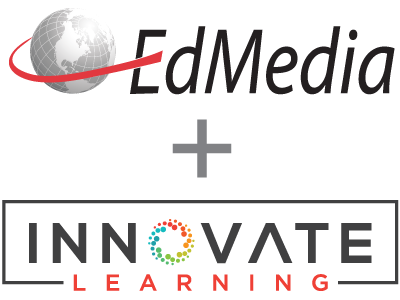
Next generation learning - Chuoagogy and technologies to transform lifelong learning
PROCEEDING
Leslie Cordie, Michael Wooten, Auburn University, United States
EdMedia + Innovate Learning, in Amsterdam, Netherlands Publisher: Association for the Advancement of Computing in Education (AACE), Waynesville, NC
Abstract
The world today is constantly changing at an ever increasing pace. The emergence of a global economy and the associated growth of technologies is driving world and industry-wide changes as companies respond to the new skills needed for workers (Raish & Rimland, 2015). New and emerging technologies are having a profound impact on how we communicate, interact, access, and use information. To succeed in these environments as future workers, today’s learners need to be educated on how to adapt and learn rapidly (Toner, 2011). No longer can students rely on acquiring just today’s knowledge; they will need different ways of learning and alternate ways of using and making sense of information (Kukulska-Hulme, 2012). Most importantly, they need to continue to learn throughout their professional and everyday lives – to truly become lifelong learners. We propose the model of Chuoagogy as the framework for teaching and learning in higher education.
Citation
Cordie, L. & Wooten, M. (2018). Next generation learning - Chuoagogy and technologies to transform lifelong learning. In T. Bastiaens, J. Van Braak, M. Brown, L. Cantoni, M. Castro, R. Christensen, G. Davidson-Shivers, K. DePryck, M. Ebner, M. Fominykh, C. Fulford, S. Hatzipanagos, G. Knezek, K. Kreijns, G. Marks, E. Sointu, E. Korsgaard Sorensen, J. Viteli, J. Voogt, P. Weber, E. Weippl & O. Zawacki-Richter (Eds.), Proceedings of EdMedia: World Conference on Educational Media and Technology (pp. 1378-1381). Amsterdam, Netherlands: Association for the Advancement of Computing in Education (AACE). Retrieved August 15, 2024 from https://www.learntechlib.org/primary/p/184354/.
© 2018 Association for the Advancement of Computing in Education (AACE)
References
View References & Citations Map- Acemoglu, D., & Autor, D. (2011). Skills, tasks and technologies: Implications for employment and earnings. Handbook of Labor Economics, 4, 1043-1171.
- Ally, M., & Prieto-Blázquez, J. (2014). What is the future of mobile learning in education? International Journal of Educational Technology in Higher Education, 11(1), 142-151.
- Arrigo, M., Kukulska‐Hulme, A., Arnedillo‐Sánchez, I., & Kismihok, G. (2013). Meta‐analyses from a collaborative project in mobile lifelong learning. British Educational Research Journal, 39(2), 222247.
- Borrás, S., & Edquist, C. (2015). Education, training and skills in innovation policy. Science and Public Policy, 42(2), 215-227.
- Cheon, J., Lee, S., Crooks, S.M., & Song, J. (2012). An investigation of mobile learning readiness in higher education based on the theory of planned behavior. Computers& Education, 59(3), 1054-1064.
- Dabbagh, N., & Kitsantas, A. (2012). Personal Learning Environments, social media, and self-regulated learning: A natural formula for connecting formal and informal learning. The Internet and Higher Education, 15(1), 3-8.
- Gabrielle, D. (2003). The effects of technology-mediated instructional strategies on motivation, performance, and self-directed learning. In D. Lassner& C. McNaught (Eds.), Proceedings of EdMedia: World Conference on Educational Media and Technology 2003 (pp. 2568-2575). Association for the
- Gikas, J., & Grant, M.M. (2013). Mobile computing devices in higher education: Student perspectives on learning with cellphones, smartphones& Social media. The Internet and Higher Education, 19, 18-26.
- Hague, C., & Payton, S. (2010). Digital literacy in the curriculum. Bristol, UK: Futurelab. Retrieved from www.futurelab.org.uk/ projects/digital-participation
- Hiltz, S.R., & Turoff, M. (2005). Education goes digital: The evolution of online learning and the revolution in higher education. Communications of the ACM, 48(10), 59-64.
- Knowles, M. (1990).The adult learner. A neglected species (4th ed.). Houston: Gulf Publishing.
- Kukulska-Hulme, A. (2012). How should the higher education workforce adapt to advancements in technology for teaching and learning? The Internet and Higher Education, 15(4), 247-254.
- Lai, K.W., Khaddage, F., & Knezek, G. (2013). Blending student technology experiences informal and informal learning. Journal of Computer Assisted Learning, 29(5), 414-425.
- Raish, V., & Rimland, E. (2015). Employer perceptions of critical information literacy skills and digital badges. College& Research Libraries. Retrieved from http://crl.acrl.org/content/early/2015/05/11/crl15-712.full.pdf+html
- Schlueter, J. (2016, June 7). Higher Ed 's biggest gamble [Editorial]. Insider Higher ED. Retrieved from https://www.insidehighered.com/views/2016/06/07/can-colleges-truly-teach-critical-thinking-skillsessay
- Straub, E.T. (2009). Understanding technology adoption: Theory and future directions for informal learning. Review of Educational Research, 79(2), 625-649.
- Toner, P. (2011). Workforce skills and innovation: An overview of major themes in the literature. Paris: OECD. Retrieved from https://search.oecd.org/innovation/inno/46970941.pdf
- Van Volkom, M., Stapley, J.C., & Amaturo, V. (2014). Revisiting the digital divide: Generational differences in technology use in everyday life. North American Journal of Psychology, 16(3), 557.
- Whitton, N. (2009). Learning with digital games: A practical guide to engaging students in higher education. London: Routledge.-1381-EdMedia+ Innovate Learning 2018-Amsterdam, Netherlands, June 25-29, 2018
These references have been extracted automatically and may have some errors. Signed in users can suggest corrections to these mistakes.
Suggest Corrections to References